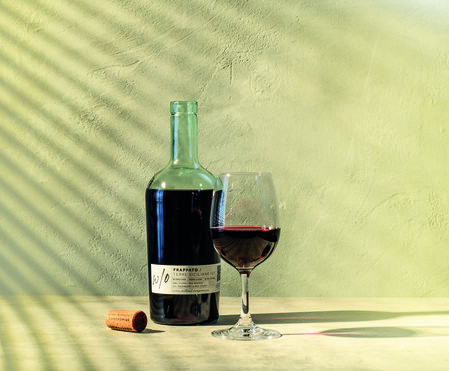This website uses cookies so that we can provide you with the best user experience possible. Cookie information is stored in your browser and performs functions such as recognising you when you return to our website and helping our team to understand which sections of the website you find most interesting and useful.
Laithwaites launches wine in recycled glass bottle
Online wine merchant Laithwaites has launched the UK’s first 100% recycled glass wine bottle after pledging to halve its carbon footprint by 2030.

Transport and glass packaging account for 68% of Laithwaites carbon footprint – vs grape growing and winemaking which are 15% and 17% respectively. The company decided to look to its packaging in order to reduce its carbon footprint and reach its green goals.
Acknowledging the lack of additional raw materials needed to create each bottle of wine by using the shorthand for ‘without’ in its name, W/O Frappato has been made in partnership with Dino Tashcetti at his co-operative winery.
The design of the recycled wine bottle also takes sustainability into account. No foil or plastic capsule has been used in the bottle’s design, meaning the cork closure remains visible. The bottle also comes with a fully biodegradable label, with additional information available via a QR code.
“Customers still want the bottle of wine they know and love, so while we will of course continue to look at alternative packaging, we wanted to find a traditional format that reduces our impact on the environment,” said Michael Johnson, innovation director at Laithwaites.
Recycled glass decreases the amount of raw materials used (sand, soda ash, limestone, feldspar) while reducing water pollution as fewer materials need to be extracted.
Glass bottles have a strong association with sustainability, and one that is much higher than bag-in-box, according to Wine Intelligence research commissioned by Vinexposium.
Bag-in-box and similar formats, such as the so-called ‘paper wine bottle’, which is made the same way as bag-in-box, but shaped like a bottle, suffer from the fact they incorporate layers of material (metallised film, plastic, card) that are hard to separate – a measure required to recycle them.
It is for this reason that they are considered a less sustainable packaging solution than heavier glass.
Meanwhile, glass offers many advantages, particularly for the wine sector, as it is a material that is virtually inert with a long shelf life, and it’s highly resealable – a particular benefit in the move towards refilling bottles rather than disposing of them. Read more on the debate on wine packaging and sustainability here.

